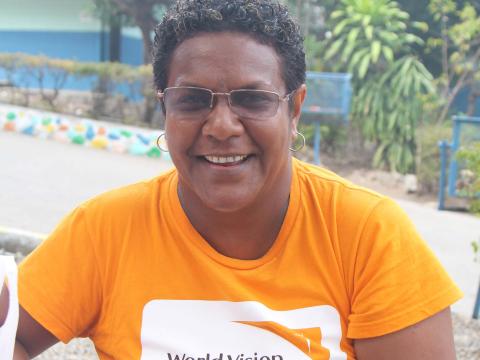Celebrating the International Humanitarian Day 2018: What it means to be a humanitarian

Name:Stella Rumbam
Position: Operations Manager (National Operations Manager for World Vision PNG during the Highlands Earthquake Response)
Time with World Vision PNG:10 years
What does being a humanitarian mean to you: Being a humanitarian means to work with vulnerable children, women, mothers and the general community in contributing to improve their lives, alleviate suffering and poverty.
Why she became a humanitarian: I felt that I could help in my capacity to assist communities and those that are in need within the community. I’m passionate about helping those that are in need.
What’s the most challenging aspect of her job: The most challenging aspect of my job is having timely access to areas where people need relief assistance. Communicating with the team on the ground for information to plan accordingly is also another task because there are areas where mobile communication is lacking hence making it very difficult at times.
One thing you wish people understood about your job: One thing I want people to understand about my job is that in situations of emergency or disaster, you are under so much stress to ensure that you’re helping those that need assistance. There is the initial phase and then the recovery phase of a disaster but the most stressing is the response or the initial stages because we want to ensure that we get humanitarian aid in, we want information, assessments need to be made for proper decision making and so forth, so working over- time to make sure that the aid gets to those who are in need.
What’s the one thing you would like to see change in communities you’ve been in? There must be more cooperation between the leaders and the people in communities so relief items, services and assistance can be shared equally to all members of the community. It is important to get the community to understand its needs and then see how they can work together to effectively support relief efforts. Often there is infighting amongst survivors, hence hindering relief assistance – some may not receive assistance because of a lack of coordination and cooperation between themselves. I would like to see this stop as it only affects those who need timely relief assistance.
What motivates you to continue your work despite the challenges: What motivates me is the smile on the faces of children and the communities, the hope they have regardless of the situation faced by their community. A simple thank you from a beneficiary motivates me. For instance, when you give out water purification tablets and show them how to use it and when they have access to clean water – that is satisfying for me. Most importantly, I’m motivated to do my job more and reach more people because of the hope they gain from what we do as aid workers.